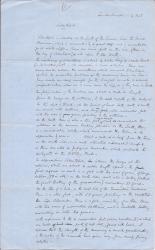
Collection of papers relating to the military career of General Sir William Cator, from the Peninsular War to the Crimean War (during which he was Director-General of Artillery). Comprising three commissions, a printed memoir, five manuscript items.
An short account of Cator's career is to be found in the Gentleman's Magazine for June 1866. This collection of nine items is of particular importance, considering the fact that - remarkably for such a distinguished figure - he was not accorded a Times obituary, and has no entry in the Dictionary of National Biography. The absence of biographical material may be due to the contemporary criticism of Cator's department for its handling of the provision of supplies during the Crimean War. All items in good condition, on lightly-aged paper, with texts clear and complete. ONE: Printed 'Memoir of General Sir William Cator, K.C.B., Royal Artillery' (8vo, 10 pp). An unbound, stapled pamphlet. Not an offprint. Excessively scarce: no copy listed on COPAC. In small type. Apparently by a family member of 'this gallant soldier, and excellent good man', as quotes from letters received by Cator from Lord Raglan and others. TWO: Draft manuscript, in an unknown hand, of part of Item One. Folio, 6 pp. On a bifolium (numbered 2) and a single leaf (numbered 3). With several signficant emendations, including clearly legible deletions. THREE: Three commissions (each with the required signatures, seals and stamps): for Lieutenant-General in 1859, for Colonel-Commandant of the Royal Artillery in 1860, and for General in the Army in 1866. FOUR: Manuscript account, in an unknown hand, of Cator's distinguished service in the Peninsular War. 4to, 4 pp. Bifolium. One short passage deleted. Beginning 'The services of Sir William Cator, when Captain of Artillery, during the siege of Cadiz were frequently mentioned in the most commendable manner by Colonel Duncan, Commg. The Artillery to The Master General of The Ordnance'. States that 'Ld. Wellington was so manifestly satisfied with the manner in which Capt. Cator had so expeditioiusly and efficiently executed his mission, that he mentioned him in his Dispatch Home.' Concludes 'Captain Cator's brilliant service at Osma, Vittoria, Tolosa, Bidassoa, Nivello, Nive and Bayonne, are officially recorded.' FIVE: Manuscript account, in an unknown hand, of Cator's career as Director General of Artillery from August 1852 to December 1858. Folio, 4 pp. Bifolium. Draft, with a few deletions and additions. States that 'it was under his directions all the extensive material & armaments for the General Siege Trains, sent to the Crimean were organized and the Army kept supplied with munitions of War'. SIX: Manuscript draft, presumably in Cator's hand, of letter by him to John Anderson, dated '6 Eaton Place | 26th. Jany 59'. Describing his association with Anderson from 1852. Cator states that in 1853 he was 'appointed President of a Committee to carry out not only Improvements you proposed to the Laboratory but also the small arm Factory at Enfield'. Breaks off suddenly after a deleted passage. SEVEN: Manuscript copy, in English, in an unknown hand, of a detailed intelligence report on Sebastopol by 'Le major Youval', dated 'Constantinople - 4 Feby'. Folio, 3 pp. On paper watermarked 'E TOWGOOD | 1853'. Covering geographical situation, fortifications, approaches, navigation, harbour, and other aspects. Youval considers Sebastopol 'very strong & very important, but not impregnable, as the Russians would have us believe'.


